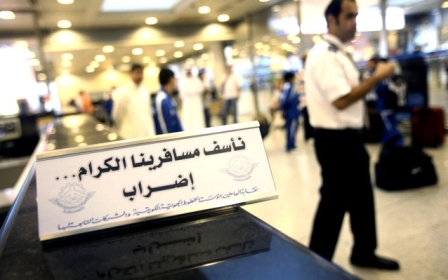GCC warned that falling oil prices could leave them with budget deficits

Oil-dependent Gulf states will face budget shortfalls if the recent decline in oil prices persists, International Monetary Fund chief Christine Lagarde warned on Saturday.
A sustained decline of $25 a barrel in the oil price would reduce the revenues of most Gulf countries by eight percent of gross domestic product, "and put many of them into a fiscal deficit situation," Lagarde told reporters.
But the six nations of the Gulf Cooperation Council (GCC) have built up fiscal buffers to cope with the immediate impact of the reduction in revenues, she said after a meeting with regional finance ministers and central bank chiefs.
The combined gross domestic product of the GCC last year reached $1.64 trillion, so in this scenario the annual revenue of the six nations could plunge by roughly $130 billion.
The total revenue of the GCC states - 90 percent of which comes from oil - more than doubled from $317 billion in 2008 to $756 billion in 2012.
It declined slightly to $729 billion last year, according to IMF estimates.
The GCC groups Bahrain, Kuwait, Oman, Qatar, Saudi Arabia and the United Arab Emirates, which together pump 17 million barrels of crude oil per day.
Oil prices have slumped by about 25 percent since June because of a production glut, weaker demand and a gloomy world economic outlook.
The US benchmark West Texas Intermediate declined to about $81 a barrel on Friday on the New York Mercantile Exchange.
Lagarde called on GCC states to implement reforms and stressed the urgent need for fiscal consolidation - an appeal echoed by Kuwait's finance minister Anas al-Saleh.
Saleh urged steps to tackle rising public spending, mainly on wages and subsidies, as well as efforts to boost the role of the private sector.
"Comprehensive economic reforms, including reforming distortions in the public finances, should be enforced," he said.
Saleh said the Gulf States must diversify their economies and "reduce dependence on oil.”
Forecasts indicate a healthy outlook for the six GCC nations, with economic growth averaging 4.5 percent in 2014-2015, Saleh said.
"But these forecasts should be treated with caution in light of fast-paced regional and international developments, particularly the drop in oil prices which has started to impact the public finances of GCC states," the Kuwaiti minister added.
Saleh has been finance minister since January 2014, and was in charge of the fiscal portfolio during Kuwait's longest-running industrial dispute in July.
Government employees stopped work for over five weeks, protesting over the Finance Ministry's failure to deliver on promised salary benefits.
Having benefitted from high oil prices for more than a decade, the GCC states have built fiscal reserves estimated at $2.45 trillion by the International Institute of Finance
New MEE newsletter: Jerusalem Dispatch
Sign up to get the latest insights and analysis on Israel-Palestine, alongside Turkey Unpacked and other MEE newsletters
Middle East Eye delivers independent and unrivalled coverage and analysis of the Middle East, North Africa and beyond. To learn more about republishing this content and the associated fees, please fill out this form. More about MEE can be found here.




